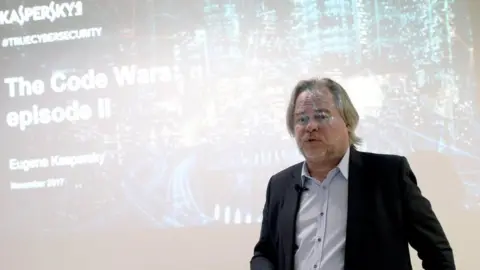Kaspersky Lab halts European cybercrime work
 Reuters
ReutersComputer security firm Kaspersky Lab has halted all cyber-crime collaboration with European agencies and organisations.
The decision is in protest against a European Parliament motion which called its software "malicious".
Kaspersky Lab said the accusation was "untrue" and demonstrated a "distinct lack of respect".
The row comes after the US and UK took steps to remove Kaspersky software from some government systems.
'No danger'
On 13 June, the European parliament adopted a cyber-security defence motion to combat the "unprecedented threat" the organisation faces from state-sponsored hacking.
Part of the strategy will involve a review of hardware and software used in its various institutions to find the "potentially dangerous programmes and devices".
The resolution, which has no legislative power, also calls for a ban on the programs and equipment "confirmed as malicious". It then names Kaspersky Lab and no other software firms.
In a statement, Eugene Kaspersky who founded the firm, said the statement was false and added: "This decision from the European Parliament welcomes cybercrime in Europe."
He said the firm had no choice but to take "definitive action".
This would involve halting all collaboration with European cybercrime-fighting initiatives, including those with the Europol agency, until it gets "official clarification" from the European Parliament about the statement.
Also paused is Kaspersky's work with the No More Ransom project which helps victims of ransomware recover their data.
In a separate public comment, Kaspersky Lab said the June statement stood in contrast to information released in April when the Commission said it had "no indication for any danger associated" with Kaspersky's anti-virus software.
It added: "Kaspersky Lab has only ever tried to rid the world of cybercrime.
"We have showed time and again that we disclose cyber-threats regardless of origin and author, even to our own detriment."
